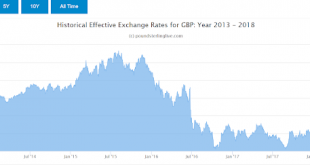Skewering Patrick Minford has become something of an economists' bloodsport. I admit, I have done my fair share of Minford-bashing, though I do try to stay away from trade economics. Others are much better at lampooning Minford's antediluvian approach to trade economics than me.But when Minford starts pontificating on the effect of currency movements on the balance of trade, I can't resist getting out the shotgun. Minford is appallingly bad on anything that involves foreign exchange. He just...
Read More »Job guarantees for the disabled
It took me a while, but it has now dawned on me why job guarantees might be very popular in the U.S., even among the sick and disabled. The clue is in this response to a tweet from Nathan Tankus: It's not just a problem for the technically disabled. Health issues are the #1 reason why people miss work and lose jobs. Many are too weak or previously injured or old before their time. Until Medicare for all, JG with benefits would be a fantastic lift for many. — Bob Spencer (@binhkhe) August...
Read More »Life after death
[embedded content] Last Friday, I watched my father die. It was the first time I had witnessed death in a human being, though I have seen it in animals. I will never forget what it looked like. The pallor of death is quite different from paleness due to shock or illness. Even before death arrives, the blood drains away from the face as if bleached, leaving behind something more like wax than human flesh. Right up to the end, I knew he could hear. He tried to open his eyes when I spoke to...
Read More »Intermezzo
No doubt you are all wondering why Coppola Comment has been quiet for the last two months. There are two reasons: the first is personal - my father is seriously ill and needs a lot of my time. But the second will I hope be music to your ears. I am writing a book. My forthcoming book will be called "The Case For People's QE" and will be published by Polity, probably in Spring 2019. Yes, I know, the title makes it sound as if I have gone over to the dark side. But I assure you I have not...
Read More »A very British disease
The desire to judge people's motives rather than addressing their needs is a “British disease”. We have been suffering from it for hundreds of years, cycling endlessly through repeated cycles of generosity and harshness. Each cycle ends in public outrage and an abrupt reversal: but the memory eventually fades, and the disease reappears in a new form. In this post, I outline the tragic history of Britain's repeated attempts to "categorise the poor". For centuries, successive British...
Read More »Velocity Matters
An accounting identity does not indicate the direction of causation. Not ever. I’ve been caught out on this a few times myself, usually when I am trying to deduce something useful from national accounting equations. But I’m merely a writer. People actually involved in the formulation of policy should know better. Here’s an attempt by people who should know better to try to infer the direction of causation from an identity. On the St. Louis Federal Reserve’s blog site is this post by Yi...
Read More »Rachel Oliver (Positive Money) and Frances Coppola TSB Internet Banking Radio 5 Interview
http://www.positivemoney.org/ Rachel Oliver (Positive Money) calls into a Radio 5 Live interview with Frances Coppola and more to comment on the TSB Internet Banking disruptions, and criticises the power the Big Banks still have, ten years after the financial crash. -------------------------- SUBSCRIBE to Positive Money UK's videos: http://www.youtube.com/subscription_center?add_user=PositiveMoneyUK Like us on Facebook http://www.facebook.com/PositiveMoney Follow us on Twitter...
Read More »Rachel Oliver (Positive Money) and Frances Coppola TSB Internet Banking Radio 5 Interview
http://www.positivemoney.org/ Rachel Oliver (Positive Money) calls into a Radio 5 Live interview with Frances Coppola and more to comment on the TSB Internet Banking disruptions, and criticises the power the Big Banks still have, ten years after the financial crash. -------------------------- SUBSCRIBE to Positive Money UK's videos: http://www.youtube.com/subscription_center?add_user=PositiveMoneyUK Like us on Facebook http://www.facebook.com/PositiveMoney Follow us on Twitter...
Read More »Arithmetic for Austrians
This piece grew from a number of conversations with people of Austrian economic persuasion, mostly Bitcoiners and goldbugs (which these days seem mysteriously to have converged). I thought of calling this "Monetarism for goldbugs", but decided to preserve the mathematical slant of the previous pieces in this series. But it's monetary arithmetic, of course. And as Austrians tend to obsess about "sound money", it is specifically sound monetary arithmetic. (Note: Someone has pointed out on...
Read More »The Bitcoin Standard – a critical review
For over a century now, the world has lacked a genuinely international means of payment. This is partly due to decisions made at the Bretton Woods conference in 1944, when the US dollar was adopted as the principal international settlement currency, rather than John Maynard Keynes's suggestion of an independent global currency that he called "bancor". Although the Bretton Woods gold-backed structure ended in 1971, the US dollar became ever more dominant. In 2008, the dollar's global reach...
Read More » Francis Coppola
Francis Coppola









